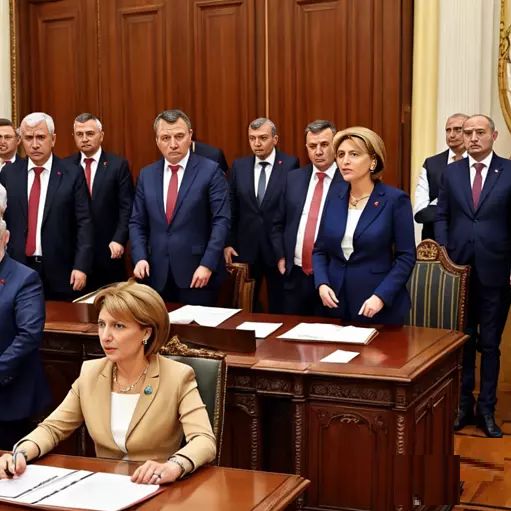Political Earthquake in Hungary: How President Katalin Novak was Forced to Resign
Hungary, a country known for its rich history and complex political landscape, recently experienced a significant upheaval with the forced resignation of President Katalin Novak. This unexpected turn of events sent shockwaves through the nation and reverberated across the international stage.
Introduction to the Political Situation in Hungary
Hungary has long been under the spotlight for its political dynamics, characterized by a dominance of the ruling Fidesz party led by Prime Minister Viktor Orban. The government’s policies have often been criticized for their authoritarian tendencies and erosion of democratic norms.
Background of President Katalin Novak
Katalin Novak, a prominent figure in Hungarian politics, rose to prominence within the Fidesz party due to her unwavering loyalty to Orban’s leadership. Her tenure as President was marked by staunch support for the government’s agenda, including controversial reforms in various sectors.
Events Leading to the Political Earthquake
Controversial Policies and Decisions
President Novak’s administration faced mounting criticism for its handling of key issues, including allegations of corruption, curbs on press freedom, and attacks on the independence of the judiciary. These policies fueled public discontent and heightened tensions within Hungarian society.
Public Discontent and Protests
As dissatisfaction with the government grew, mass protests erupted across major cities in Hungary. Citizens took to the streets to voice their grievances, demanding accountability and transparency from their leaders. The protests gained momentum, putting increasing pressure on President Novak and her administration.
The Resignation of President Katalin Novak
Pressures and Criticisms
Amid escalating protests and internal turmoil, President Novak faced mounting pressure from both within and outside her party. Criticisms of her leadership style and perceived failures to address the concerns of the populace intensified, leaving her position increasingly untenable.
Addressing the Nation
In a televised address to the nation, President Novak announced her decision to step down from office, citing the need to prevent further division and instability within Hungary. Her resignation sent shockwaves through the political establishment and marked a dramatic turning point in Hungarian politics.
Impact on Hungarian Politics
Succession Plans
With President Novak’s resignation, questions arose regarding the succession process and the future direction of Hungarian politics. Prime Minister Orban moved swiftly to nominate a successor, signaling his determination to maintain control over the country’s political landscape.
Changes in Government Dynamics
The departure of President Novak ushered in a period of uncertainty and realignment within the Hungarian government. The balance of power shifted as rival factions within the ruling party jockeyed for influence, leading to potential changes in policy direction and decision-making processes.
Reactions from the International Community
The political earthquake in Hungary did not go unnoticed on the international stage, with foreign leaders and organizations expressing concern over the developments. Calls for respect for democratic principles and the rule of law echoed from capitals around the world, highlighting the global significance of Hungary’s internal affairs.
Future Outlook for Hungarian Politics
As Hungary grapples with the aftermath of President Novak’s resignation, the future trajectory of its political landscape remains uncertain. The coming months are likely to witness intense political maneuvering, as competing forces vie for control and influence in a rapidly evolving environment.
Conclusion
The forced resignation of President Katalin Novak has sent shockwaves through Hungarian politics, marking a significant turning point in the country’s political trajectory. As Hungary navigates through this period of uncertainty, the eyes of the world remain fixed on its future direction and its commitment to democratic principles.
Unique FAQs:
- What were the main reasons behind President Novak’s resignation? President Novak cited mounting pressure from public protests and criticisms of her administration’s policies as key factors leading to her resignation.
- How has the Hungarian government responded to the political earthquake? Prime Minister Orban swiftly nominated a successor to President Novak and moved to consolidate control over the ruling party amidst the turmoil.
- What are the implications of President Novak’s resignation for Hungarian democracy? The resignation has raised concerns about the state of democracy and the rule of law in Hungary, prompting calls for greater accountability and transparency from the government.
- How have international actors reacted to the developments in Hungary? Foreign leaders and organizations have expressed concern over the erosion of democratic norms in Hungary and called for respect for fundamental rights and freedoms.
- What is the outlook for Hungarian politics in the aftermath of President Novak’s resignation? The future trajectory of Hungarian politics remains uncertain, with potential shifts in power dynamics and policy direction as rival factions vie for control amidst ongoing protests and discontent.



